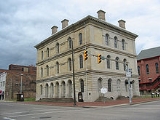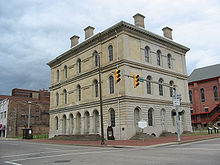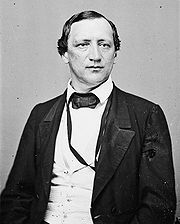
Wheeling Convention
Encyclopedia

Ordinance of Secession
The Ordinance of Secession was the document drafted and ratified in 1860 and 1861 by the states officially seceding from the United States of America...
passed by Virginia
Virginia
The Commonwealth of Virginia , is a U.S. state on the Atlantic Coast of the Southern United States. Virginia is nicknamed the "Old Dominion" and sometimes the "Mother of Presidents" after the eight U.S. presidents born there...
, thus establishing the Restored government of Virginia
Restored government of Virginia
The Restored Government of Virginia, or the Reorganized Government of Virginia, was the Unionist government of Virginia during the American Civil War. From 1861 until mid-1863 it met in Wheeling, and from 26 August 1863 until June 1865 it met in Alexandria...
, which ultimately authorized the counties that organized the convention to become West Virginia
West Virginia
West Virginia is a state in the Appalachian and Southeastern regions of the United States, bordered by Virginia to the southeast, Kentucky to the southwest, Ohio to the northwest, Pennsylvania to the northeast and Maryland to the east...
. The convention was held at what became known as West Virginia Independence Hall
West Virginia Independence Hall
West Virginia Independence Hall is located in Wheeling, West Virginia, where it was built in 1860, under the supervision of architect Ammi B. Young...
in Wheeling
Wheeling, West Virginia
Wheeling is a city in Ohio and Marshall counties in the U.S. state of West Virginia; it is the county seat of Ohio County. Wheeling is the principal city of the Wheeling Metropolitan Statistical Area...
. The Restored Government was recognized by the Union, including President Lincoln
Abraham Lincoln
Abraham Lincoln was the 16th President of the United States, serving from March 1861 until his assassination in April 1865. He successfully led his country through a great constitutional, military and moral crisis – the American Civil War – preserving the Union, while ending slavery, and...
, as the State of Virginia with its capital in Wheeling. In part motivated by early Union successes, including the Battle of Philippi Races
Battle of Philippi Races
The Battle of Philippi—also known mockingly as "The Philippi Races"—was fought on June 3, 1861, in and around Philippi, Virginia as part of the Western Virginia Campaign of the American Civil War...
, it was preceded by the Clarksburg Convention and led to the Constitutional Convention
Constitutional convention (political meeting)
A constitutional convention is now a gathering for the purpose of writing a new constitution or revising an existing constitution. A general constitutional convention is called to create the first constitution of a political unit or to entirely replace an existing constitution...
of West Virginia.
First Wheeling Convention

John Jay Jackson, Jr.
John Jay Jackson, Jr. was a United States federal judge, first from Virginia, and then from West Virginia, at the time of its creation as a separate state.-Early life and career:...
of Wood County
Wood County, West Virginia
As of the census of 2000, there were 87,986 people, 36,275 households, and 24,884 families residing in the county. The population density was 240 people per square mile . There were 39,785 housing units at an average density of 108 per square mile...
suggested seating all northwestern Virginians, but John S. Carlile
John S. Carlile
John Snyder Carlile was an American merchant, lawyer, and politician, including a United States Senator. A strong supporter of the Union cause during the American Civil War, he represented the loyalist faction of Virginia, which was eventually separated into two distinct states over his...
insisted that only those who had been legitimately appointed by their constituencies be allowed to participate. Chester D. Hubbard
Chester D. Hubbard
Chester Dorman Hubbard was a U.S. Representative from West Virginia, father of Congressman William Pallister Hubbard....
of Ohio County
Ohio County, West Virginia
As of the census of 2000, there were 47,427 people, 19,733 households, and 12,155 families residing in the county. The population density was 447 people per square mile . There were 22,166 housing units at an average density of 209 per square mile...
ended the debate by proposing the creation of a committee on representation and permanent organization.
Some, including Jackson, argued that preemptive action against the Ordinance of Secession before it was ratified was unwise: the Ordinance had not yet been presented to the citizens of Virginia for a vote, and would not be until May 23. Others, including John Carlile, insisted on immediate action to "show our loyalty to Virginia and the Union", and on May 14, he called for a resolution creating a state of New Virginia. Waitman T. Willey
Waitman T. Willey
Waitman Thomas Willey was an American lawyer and politician from Morgantown, West Virginia. He represented both the states of Virginia and West Virginia in the United States Senate and was one of West Virginia's first two Senators.Willey was born in 1811, in a log cabin near the present day...
responded to Carlile's plan by saying that it was "triple treason" — treason against the state of Virginia, the United States, and the Confederacy. Carlile's motion was condemned as revolutionary, and most at the Convention instead supported resolutions offered by the Committee on State and Federal Resolutions, which recommended that western Virginians elect delegates to a Second Wheeling Convention to begin on June 11 if the people of Virginia approved the Ordinance of Secession.
Second Wheeling Convention
With the adoption of Virginia's Ordinance of Secession on May 23, the Second Wheeling Convention began on June 11 as decided at the First Convention. The meeting was held in Washington Hall and later the Custom House. The first measures adopted at the Convention ruled that 88 delegates representing 32 counties were entitled to seats in the convention, though other delegates would be accepted later. Arthur I. BoremanArthur I. Boreman
Arthur Inghram Boreman was the first Governor of the U.S. state of West Virginia and a United States Senator.-Biography:...
was selected to serve as president, and he declared, "We are determined to live under a State Government in the United States of America and under the Constitution of the United States."
On June 13, John Carlile introduced to the convention "A Declaration of the People of Virginia," a document calling for the reorganization of the state government on the grounds that Virginia's secession had in effect vacated all offices of the existing government. Carlile presented an ordinance for this purpose the next day, beginning the debate. Virtually all the delegates at the Convention recognized the differences between eastern and western Virginia as irreconcilable and supported some sort of separation; the disagreement was over how this separation should occur. Dennis Dorsey of Monongalia County
Monongalia County, West Virginia
As of the census of 2000, there were 81,866 people, 33,446 households, and 18,495 families residing in the county. The population density was 227 people per square mile . There were 36,695 housing units at an average density of 102 per square mile...
called for permanent and decisive separation from eastern Virginia. Carlile, however, though he had called for a similar plan during the First Convention, persuaded the delegates that constitutional restrictions made it necessary for the formation of a loyal government of Virginia, whose legislature could then give permission for the creation of a new state. On June 19, delegates approved this plan unanimously.
The next day, June 20, the convention selected new officers of the Virginia state government (usually called the "Restored government of Virginia" to avoid confusion with the secessionist government in Richmond
Richmond, Virginia
Richmond is the capital of the Commonwealth of Virginia, in the United States. It is an independent city and not part of any county. Richmond is the center of the Richmond Metropolitan Statistical Area and the Greater Richmond area...
). Francis Pierpont of Marion County was elected governor. On June 25, the Convention adjourned until August 6.
Archives
The proceedings of the First Wheeling Convention were recorded by Judge Gibson Lamb Cranmer of Ohio County, Charles B. Waggener of Mason County, and Marshall M. Dent of Monongalia County. Judge Cranmer was also the Secretary of the Second Wheeling Convention and custodian of the manuscript proceedings, journals, and other documents of the Convention. Judge Cranmer's records for the convention were lost during the flood of 1884 of Wheeling Island. Copies of the records were sought in AlexandriaAlexandria, Virginia
Alexandria is an independent city in the Commonwealth of Virginia. As of 2009, the city had a total population of 139,966. Located along the Western bank of the Potomac River, Alexandria is approximately six miles south of downtown Washington, D.C.Like the rest of northern Virginia, as well as...
and Richmond but no such copies were found. The records of these Conventions were reconstructed by Virgil A. Lewis, State Historian of West Virginia, from daily records printed in the Wheeling Daily Intelligencer. They were published by Lewis as How West Virginia Was Made in 1909.

